When I totaled up my monthly review stats way back in September, I realized that I had lost focus on recent science fiction. Of the 174 works I had reviewed thus far in 2023, only six or seven1 were science fiction books published in 2023. This despite the fact that science fiction is my favourite flavor of speculative fiction. I blame Communism, Senator Proxmire, and the Thor Power Tool Decision the distraction of older works and the long-running dominance of fantasy.
In case other readers are similarly retro-focused and interested in finding some newer material, I can suggest the following five 2023 science fiction works that are well worth reading.
Translation State by Ann Leckie (2023)
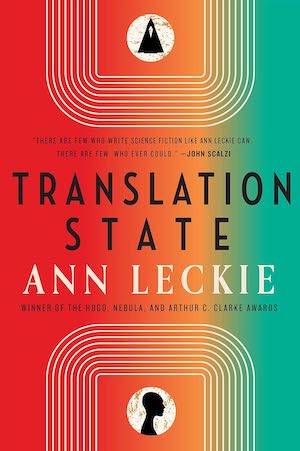
Foundling Reet Hluid, raised by doting adoptive parents, has no idea who his biological progenitors might have been. Heroth Nadkal, President of the Siblings of Hikipu, offers one possibility: perhaps Reet is a long-lost Schan, in which case he may be destined to glory as an inspiring figurehead for the oppressed Hikipu. However, the enigmatic Presger Translators offer an entirely different possibility, one (that if true) means that not only is Reet not a human of lofty status, he is not a human at all.
Leckie’s first novel in…is it really four years?…is a standalone that shares a setting with her Hugo-winning Imperial Radch novels, though it takes place largely outside the Radch. Translation State focuses on non-Radchaii characters who use a variety of pronouns, reflecting a spectrum of nonbinary gender identities. The novel also features a court proceeding concerning what precisely counts as human, a subject long dear to SF’s heart. Unfortunately for Reet, in this case the criteria are less “talks and can make fire”2, and more “does not inadvertently present an existential threat to unwary humans.”
Life Beyond Us edited by Julie Nováková, Lucas K. Law, and Susan Forest (2023)
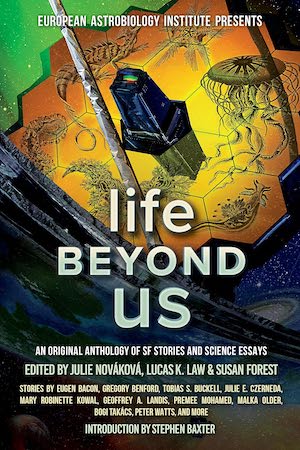
The editors offer a classic assortment of science essays accompanied by thematically-related science fiction stories. Authors selected for inclusion range from famous to not yet famous. Subjects examined are wide-ranging. Happily, the anthology is hefty enough to stun an ox if hurled vigorously, which allows ample room for the extensive contents.
I was surprised to notice that despite the complications imposed by an ongoing pandemic, the editors delivered their tome as promised and very nearly on time. Other editors could heed Nováková, Law, and Forest’s example.
Station Six by S. J. Klapecki (2023)
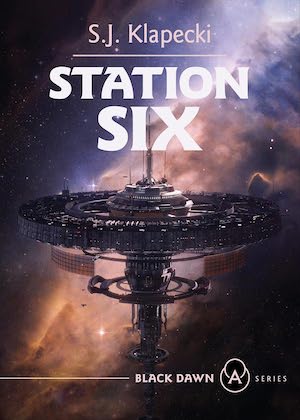
Lunar Module Construction — LMC — has employed many workers on its Station Six. The pay was low, benefits nonexistent … but at least it was a job. Now LMC is firing them all. The illicit Federation of Unions is recruiting the fired workers. LMC retaliates with the army of mercenaries it keeps on retainer.
In Station Six, “union” denotes an organization of workers who use collective bargaining and other measures when necessary to secure more equitable arrangements for their members. Where do SF authors get their crazy ideas?
Flight & Anchor by Nicole Kornher-Stace (2023)
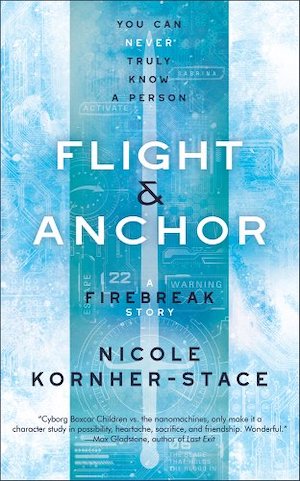
Tweens O6 and 22 were taken and remade by the Stellaxis corporation into child super-soldiers. When 06 and 22 escape Stellaxis, the Director of the program must find some way to entice the pair back. Entice, not compel, because these super-soldier kids are faster, stronger, and tougher than baseline humans. The Director has one big advantage: the cyborgs require constant upkeep to survive.
This novella is a prequel to Kornher-Stace’s 2021’s Firebreak. In the spirit of “the dog doesn’t die,” since older versions of 06 and 22 appear in Firebreak and other works, it is unlikely either will die in this prequel. It seems odd that I would encounter two 2023 SF novels about workers being brutally exploited by ruthless corporations. What possible reason could there be for SF authors to focus on this subject in particular at this specific moment in time? This must be just one of those odd coincidences one sees from time to time in SF…
The Deep Sky by Yume Kitasei (2023)
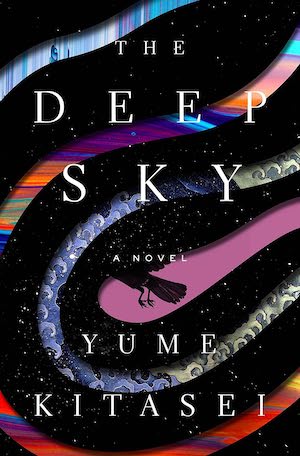
Charismatic visionary billionaire Linda Trembling convinced the nations of Earth to set aside their differences in order to fund the sub-light starship, Phoenix. A decade after launch, Phoenix’s mission is imperiled by sabotage. Is the bomber a ringer planted on the crew by terrestrial terrorists? Was the bomb an expression of escalating international rivalries? Or is there some other explanation? Perhaps Asuka can find the answers…if only Asuka weren’t the least qualified person on board Phoenix.
Phoenix would be a tribute to what a single highly motivated oligarch can accomplish using other people’s money were it not for a few disturbing details: the starship crew was selected via a process seemingly designed to exacerbate divisions; certain vital subsystems lack redundancy. Ah well…plot fodder, and room for sequels.
***
Obviously, there have to have been far more new SF novels and novellas published this year than the five above. Readers, please feel free to recommend science fiction works published in 20233 in comments below.
In the words of fanfiction author Musty181, four-time Hugo finalist, prolific book reviewer, and perennial Darwin Award nominee James Davis Nicoll “looks like a default mii with glasses.” His work has appeared in Interzone, Publishers Weekly and Romantic Times as well as on his own websites, James Nicoll Reviews (where he is assisted by editor Karen Lofstrom and web person Adrienne L. Travis) and the 2021, 2022, and 2023 Aurora Award finalist Young People Read Old SFF (where he is assisted by web person Adrienne L. Travis). His Patreon can be found here.
[1]This count will depending on your definition of science fiction. I like the library definition: books that have little rockets and atom symbols on the spine, not unicorns.
[2]I am a... little fuzzy… on the exact phrasing of this venerable metric.
[3]If you want to suggest works first translated into English in 2023, please do!










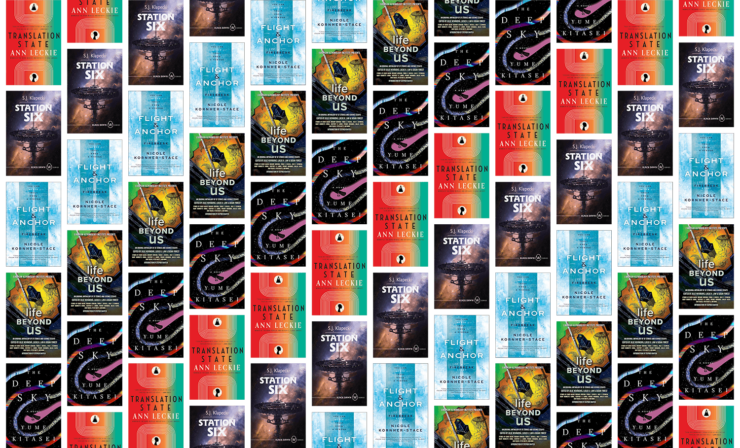
I loved Leckie’s Translation State.
I’m here to also recommend Martha Wells Witch King, and her new Murderbot novel. And Alix Harrow’s Starling House! And — I’ll stop now.
I liked Witch King but I saw it as more of a unicorn label on the spine book, not atom-and-rocket.
“Obviously, there have to have been far more new SF novels and novellas published this year than the five above.”
Yep, obviously, so I’m not sure why these were not noted:
The Terraformers by Annalee Newitz
Meru by S. B. Divya
The Mimicking of Known Successes by Malka Older
Rose/House by Arkady Martine
Furious Heaven by Kate Elliott
Promises Stronger Than Darkness by Charlie Jane Anders
Dual Memory by Sue Burke
The Roamers by Francesco Verso
The Ghosts of Trappist by K. B. Wagers
The Blue, Beautiful World by Karen Lord
Those are just the ones I’ve read, having read only one on your list.
@3 Probably because he either hasn’t read them yet or they didn’t have spaceships on the spine? Just throwing out wild guesses here.
@OP, footnote 2: I SEE YOU, SIR.
I bounced off Terraformers, and I mentioned Rose/House in another essay. I did read both the Older and the Divya… in 2022 [1], so I cannot count them as SF books read in 2023. I own many of the rest but have not yet read them because I am a vortex of pure evil have not yet been able to fit them into my schedule.
1: I receive an abundance of electronic advanced reader copies (the copies are electronic, not the readers) well before release. In fact, I expect to start seeing 2025 books in my in-box within a few months. I am not always good at resisting temptation.
The Ghosts of Trappist by K.B. Wagers
Generation Ship by Michael Mammay
Some Desperate Glory by Emily Tesh
Bridge by Lauren Beukes
Caitlin Starling’s Last to Leave the Room balances between fantasy and science fiction, but it was so good I made myself late for work in order to finish it.
And Ness Brown’s novella The Scourge Between Stars is perfect bite-sized space horror.
None of us can agree with everyone about everything. The Terraformers is my favorite SF of the year so far, the only other novel coming close is S. L. Huang’s The Water Outlaws.
Derek Kunsken is writing some of the hardest of hard science fiction in his colonization of Venus series starting with The House of Styx. This year saw the next book, The House of Saints, a great read but they should be read in order.
I should mention that yesterday Martha Wells’ new Murderbot book just dropped, System Collapse. I haven’t read it yet but I can almost guarantee it’ll be on my list of top SF titles of the year.
Life Beyond Us is slowly bubbling to the top of the To Be Read pile. Under a couple of Scalzis. It’s definitely substantial enough for close-in home defense.
I think “talk and build a fire” applied more towards being minimally sapient rather than just Human. The Khoogras of Yggdrasil are (barely…) sapient under that rule.
Prompt: Review the novel “Translation State” by Ann Leckie.
Generated answer: I’m sorry, but as of my last knowledge update in January 2022, there is no information available about a novel titled “Translation State” by Ann Leckie. It’s possible that this book was released after my last update, or it may not exist. To get the most accurate and up-to-date information, I recommend checking recent book reviews, the author’s official website, or reliable book retailers for the latest releases. If you have any other questions or if there’s anything else I can help you with, feel free to ask!
Remark checks out. For now.
Unfortunately, ChatGPT did correctly identify ‘the first Murderbot novel’ and I think its review reflects general opinion.
Leckie strikes me as the best SF novel of the year. However, I’m looking forward to new “Murderbot,” Mur Lafferty’s “Chaos Terminal,” and Samit Basu’s “The Jinn-Bot of Shantiport” to end the year on a strong note.
I’m normally at least a year behind catching up on new fiction, so I’m afraid I’ve only read two SF books from this year: “Beyond the Reach of Earth” by Ken MacLeod and “Starter Villain” by John Scalzi. They were both great, as expected.
I had a go at “Terraformers”, but I had to bail out at the levitating moose, it wasn’t working for me.
@9 I’m halfway through it and inclined to agree!
Seconding Some Desperate Glory, which is one of the best things I’ve read all year in any subgenre.
” Mur Lafferty’s “Chaos Terminal,” and Samit Basu’s “The Jinn-Bot of Shantiport”
Those are both recent reads for me, last night for the Lafferty. I enjoyed both. I owe rec.arts.sf.written some reviews.
Translation State made me extremely happy, not just because the writing and plot are brilliant, but because I’d been very curious about the Presger Translators since the end of the Radch trilogy, and had not expected to learn any more about them. It was only when I started reading it and realized that it involved them that I realized how much I’d wanted such a book, and it delivered in spades.
Life Beyond Us is a marvel and a mast read… Then, I may be biased somewhat… :)
Footnote 2: Aaaarrrggghhh!!!!
I read only short stories so I would be interested in more reviews of anthologies.I own a copy of Life Beyond Us and dip into it when I want some hopefulness.(having just looked at the photos of the beautiful young people murdered on Oct.7 urgently in need of some)
I was fortunate enough to back Life Beyond Us Kickstarter. It was one of the best campaigns I’ve ever backed. Amazing communication, great organization and work; plus they did a page of thank you’s I got to be included in. Very fun.
it is quite the tome and well worth the money. I’ve got it on my nightstand for when I want a break of a quicker story or article; or in case anyone tries to attack me in my sleep! The hardcover could definitely knock someone out!
Nic to see it included here given how indie it is!
Lavie Tidhar The Circumference of the World
Glad to join the other fans of Translation State.
“Translation State” was a big favorite of mine; I love Ann Leckie’s work. I read some other really enjoyable SF novels this year, too:
“Ghost Station” by S.A. Barnes (yes, it doesn’t actually come out til 2024. I read an ARC. It still counts. More spoooookiness in space!)
“System Collapse” by Martha Wells (Murderbot! Murderbot!)
“We Have Always Been Here” by Lena Nguyen (Ok, the science is a little hand-wave-y. But it’s still a lot of fun. Weird planet, sentient androids, android-haters, mutineers, and uncaring corporations.)
“Rubicon” by J. S. Dewes (Really good military SF that examines the inevitable PTSD of using “disposable” bodies while the soldier’s minds continue to experience death over and over.)
“The Scourage Between Stars” by Ness Brown (Scary space novella!!)
“Rose/House” by Arkady Martine (Martine’s work is an insta-buy for me. This one is about a sentient house that doesn’t like you.)
Connie Willis’ latest, The Road to Roswell, is laugh out loud funny,